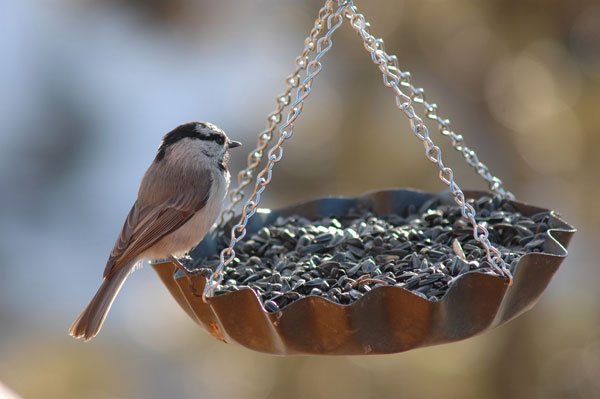by Nichol Phillips, Marketing Manager at Global Harvest Foods
Birds have a year-round need for reliable, steady sources of food. You can help them when food sources are scarce by providing bird feeders with seeds, suet, or fruit to supplement birds’ natural foraging. In winter, bird feeders provide a reliable place to find a meal when their usual food sources are buried under snow; during the summer breeding season, feeders offer extra nutrition that helps birds to raise strong healthy babies. The simple act of supplying backyard bird feeders will give your feathered friends overall better health than birds in places without feeders.

On average, birds eat approximately 1⁄2 to 1⁄4 of their body weight every day. By feeding the birds, you provide an efficient way for birds to use their limited foraging energy.
The best part? It’s almost as good for you as it is for the birds! The benefits of bird feeding are virtually endless.
Different kinds of birds will visit, entertaining you with their different behaviors and personalities.
Birds also eat insects, providing organic pest control without the toxic chemicals.
Did you know that birds assist with flower pollination? Worldwide, there are about 2,000 species of pollinating birds. These birds help fertilize plants by transferring pollen from one flower to another as they fly between feeding on nectar or seeds.
Small birds such as finches eat seeds from seed-bearing flowers or weeds that you may find undesirable in your yard. Feeding these smaller birds will attract them to your yard and encourage them to help with your gardening.
Artists can find endless inspiration in the antics of wild birds. If you’re quick enough, you may be able to catch a photo – or if you’re really lucky, paint them in a landscape.
Many of us live in urban neighborhoods. Feeding wild birds can reconnect us with the rhythms of the natural world around us. Kids in particular can benefit from learning about different birds in their own yard: think of it as an outdoor science class.
Choosing Your Feeder
The more feeders you hang and the more kinds of food you offer, the wider your variety of feathered visitors will be.
Tray Feeders are versatile because they can hold virtually any type of bird food, but most will offer no protection from the elements. Check your seeds often to keep them fresh and dry.
Hopper Feeders will fare better in wet or cold seasons because they offer some protection and a dry place to feed. These large capacity feeders are popular with medium-sized birds like grosbeaks and cardinals.
Window Feeders attach directly to the windows of your house for a close-up look at the birds who come to feed. Some adhere to the window surface with suction cups; others can be installed into the window frame. All window feeders are made with clear acrylic to give you the best possible view of your wild visitors.
Tube Feeders are perfect for smaller songbirds who may not be able to find room at large feeders. Fill them with black oil sunflower seed to attract nuthatches, chickadees, titmice, redpolls, wrens and sparrows.
Nyjer® (also called Thistle) Feeders are a favorite of goldfinches and buntings. These often look like regular Tube Feeders, but their tiny seed ports are exclusively for use with fine seeds like thistle or millet. This can also help to prevent the neighborhood squirrels from stealing your birds’ lunch!
Suet Feeders are wire mesh baskets that hold suet cakes made with a mix of fat, nuts, seeds and sometimes fruit or insects. Look for woodpeckers, warblers, chickadees and jays to stop by for a high- energy treat.
Hummingbird feeders are clear or colored cylinders that hold liquid sugar water. They often feature bright reds or floral patterns, visual cues that are known to attract hummingbirds. Changing the nectar weekly will prevent fermentation and keep these beautiful acrobatic birds happy.
To learn more, visit www.audubonpark.com/discovery-center/ for informational videos and tips on how to enhance your life with birds. Nyjer® is a registered trademark of the Wild Bird Feeding Industry.


